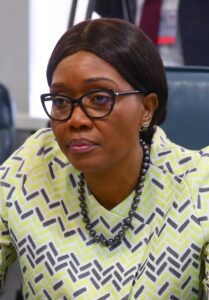
By:Megameno Shinana
The dramatic comeback of prime minister Saara Kuugongelwa-Amadhila, Khomas regional governor, Laura Veendapi McLeod-Katjiruaand others in the second round of vote verification and certification after allegations of ballot tampering has seriously cast doubt on the party’s inside processes, especially on vote counting.
The fact that it has taken longer than the scheduled period for the final election outcome to be published has seen critics questioning the ability of the party to run its own electoral affairs.
The prime minister and the Khomas governor, together with the likes of Lucia Witbooi and Anna Nghipondoka, had to pass through the eye of the needle only after serious concerns were expressed on how Joshua Kaumbi had handled the process.
A petition did the rounds, said to be from the party’s chief administrator Sophia Shaningwa, who ordered a verification process at the back of strong criticism that she had no power to do that.
The return of these party bigwigs after an initial round of defeat has left political observers questioning whether indeed this was proof that the congress was marred by ballot tampering.
‘The way it was handled does not inspire much confidence in Swapo’s internal procedures and the way Joshua Kaumbi handled the counting and verification process. We have to hope that they got it right eventually. If not, there will no doubt be legal challenges,” said Graham Hopwood, director at the Institute of Public Policy Research.
For some, the noise around the first results could not have come had these party big-wigs made it through.
Public policy analyst Dr. Ndumba Kamwanya observed that there are a number of things which needed to be seriously considered on the congress outcome and the last-minute dramatic maneuvres.
Kamwanya submits that the reality that the party could not count a mere over 700 votes in time is telling of the mediocrity in which it found itself as of late. He further said the party must explain the basis of the first list where it came from and what it was based it on.
“In addition, if the central committee congress results were subjected to a verification process, what about the results of the top-four positions? What makes them more credible than the central committee results? Clarity is needed on both. The source of the second list must also be explained clearly,” he maintained.
“Otherwise, it looks like a made-up list. If anything, it does not seem to be based on the real delegates’ votes. Who or what legal structure in party ordered the recount to verify the central committee result? Only a legally constituted entity within Swapo, such as the politburo and central committee, can legally order such a recount,” he argued.
“The top four of the party are not a constitutional structure but mere a position subjected to the mandate of the party structure. So, there is a constitutional crisis here but also Swapo is at crossroads. They seem to generate more entanglements than solutions. The second central committee list is not a solution but created more division and confusion,” Kamwanyah said.
Political analyst Rui Tytendeput question marks on the very first round of the results, submitting that they did not make sense given that a powerful contender like Kuugongelwa-Amadhil could not make it to the central committee.
“How could someone who was one of the leading contenders not be elected on the most powerful body of Swapo between congresses? What went wrong during the first round of votes and verification? Was it deliberate or a mistake since there is a new Sheriff in town tasked to handle the election process?” he questioned
“Either way, those are serious mistakes to be made and a thorough investigation or review needs to be conducted to determine whether any wrongdoing was intentional or unintentional. The legitimacy and integrity of the elections should never be in question as it does not bode well for internal party democracy and unity,”Tytende submitted.
“It raises unwanted questions and concerns. For instance, if the ruling party’s internal electoral affairs are marred by allegations of fraud and irregularities, what about national elections where they have a direct influence through individuals employed at the Electoral Commission of Namibia?” he further queried.









Comments